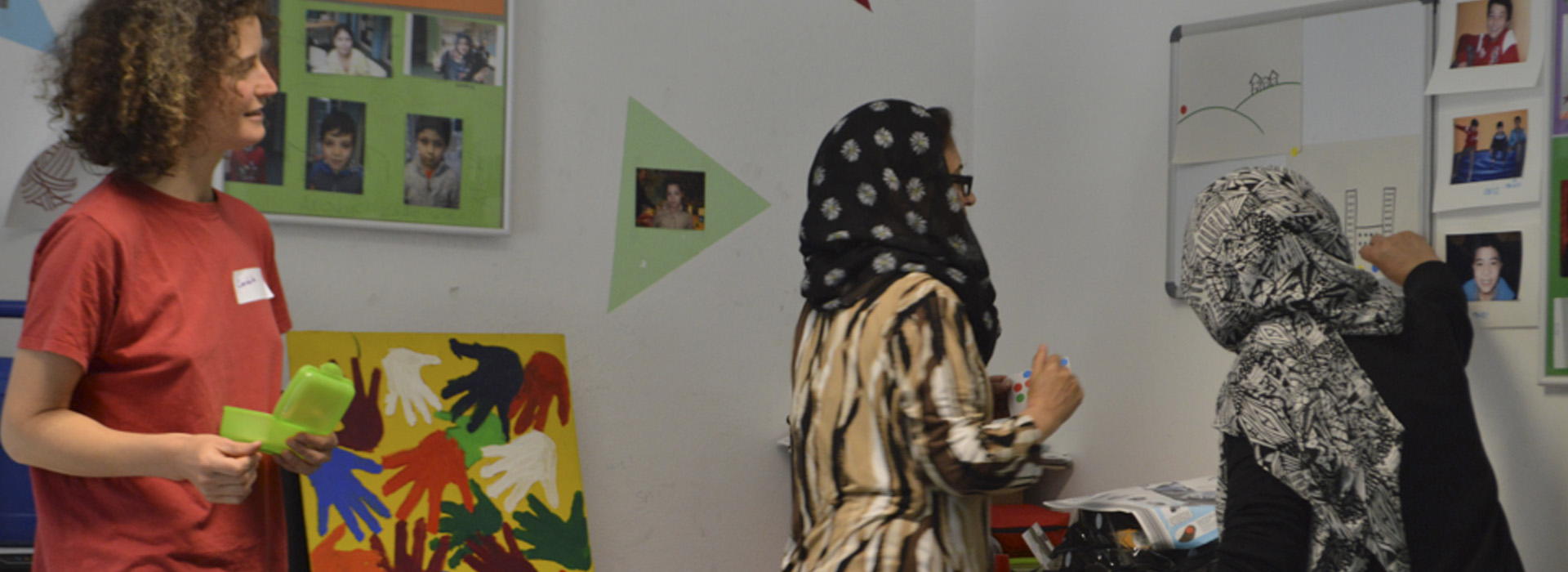- Introduction
- 1. THEORETICAL BACKGROUND
- 2. EXPERIENCES AND CHALLENGES FROM THE INTERCULTURAL GARDENS
- 3. PRACTICAL STEPS TOWARDS EMPOWERMENT
- Excercises and Self Assessment
- References & Links
Overview:
This module deals with the need to empower migrants and empowering opportunities of intercultural gardens.
This module focuses on the following:
- Models of empowerment.
- Experiences from intercultural gardens.
- Activities promoting empowerment in intercultural or community gardens.
Knowledge
- To gain knowledge about different concepts of becoming part of a society.
- To gain understanding for the need to empower people.
- To know how to support the empowering of people.
Skills
- How to set up projects together with and not for migrants.
- How to share responsibilities.
Attitudes
- The understanding that integration is not a one way process.
Integration – Inclusion – Empowerment
Different concepts for enhancing participation in society
Has historically seen a strong focus on individuals who are responsible for integrating themselves into a homogenous host society. The concept of integration thereby creates a polarisation between „we and the others“. This can also be seen in lexical definitions of integration:
„to mix with and join society or a group of people, often changing to suit their way of life, habits, and customs“ (Cambridge Dictionary 2019)
In recent discussions the concept of integration has moved more towards a complex process with an inclusionary goal implying equal opportunities and rights for all human beeings. (Caritas 2018)
Defines the diversity of people as the norm. Whereas integration has a stronger focus on individuals inclusion has a more systemic approach. The state and society is responsible for giving everyone the same chances and opportunities (Caritas 2018) The system has to transform in order to ensure participation of all independent from their starting position. (Georgi 2015)
The concept of inclusion emphasises the things that bring people together instead of the differences among people and focuses on unlimited participation in all areas of society (Neußl-Duscher 2016)
Is defined as:
- „extending one’s ability to take effective decisions;
individuals, groups and/or communities taking control of their circumstances
and achieving their own goals.” (Braye and Preston-Shoot 1995) - „the process of gaining freedom and power to do what you want or to control what happens to you.“ (Cambridge Dictionary 2019)
Migrants are often confronted with the exact opposit situation. People with former self-determined lives and many social contacts, find themselves linguistically and socially isolated with rare possibilities of setting their own goals and undertaking meaningful actions.
Although working on an individual or group level empowerment is more closely related to the concept of inclusion. Empowerment aims at strengthening individuals or groups who are systematically excluded and disadvantaged to gain control over assets and benefits and to be able to participate in decision making. (CIAT 2019)
Empowerment is a resource-based approach aimed at creating spaces and situations in which people can reach their potentials.
Opportunities and challenges to empowerment in intercultural gardens�
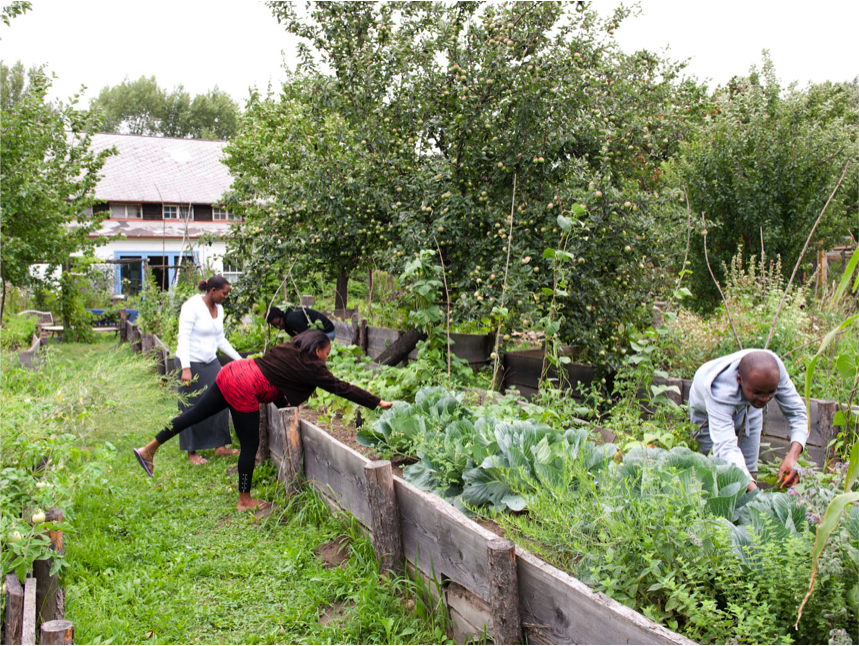
Intercultural gardens can be a precious resource for empowerment. This can be seen in some of the aims of the intercultural garden in Göttingen (Germany). The garden can
- Contribute to the revival of self-initiative and individual work
- Give meaning by beeing productive while dealing with unemployment and loneliness
- Contribute to some self sufficiency
- Offer a space for social encounter with locals
- Enhance theunderstanding of different cultures a migration causes
- Help process trauma and strengthen the psycho-social well being
- Increase competences and experiences through education and help people reorienting towards a new profession.
Other garden users emphasise the importance of gardens for empowement as follows:
- Having a break from “being a migrant” and just being able to be a person and a gardener for a while
- The intercultural garden offers a space where people can share their skills, change positions from teacher to learner and from learner to teacher as each person is skilled and resourceful.
- The intercultural garden is a place people can call their own that they feel they belong to.
- The intercultural garden is a place where people can take over responsibilities, from the responsibility for their own growing bed to leading single working groups and activities or becoming part of the steering group.
While most intercultural gardens have set themselves the aim of integration and/or inclusion and empowerment there are several restrictions and challenges.
Many intercultural gardens were started in a top-down approach by institutions or by local volunteers who have grown up in the country. Goals are often set by the initiators and decision making processes are designed according to their ideas and attitudes. How to pass on responsibilities and transform decision making procedures to faciltiate equal participation possibilities of all participants might be challenging for the original steering group.
Where intercultural gardening projects are set up for refugees, participants tend to see them as the initiators' project and not as their own garden.
“Many times the failure is to know from the beginning how integration works.” (Garden manager, Garten der Begegnung, 2019)
Where garden groups want to organise in an inclusive way with flat hierarchies and full participation in decicion making of all members, they also encounter obstacles. Gardeners who live challenging and stressful lives might not want to be involved in decision making and organisation but desire clear structures and understandable tasks.
Further factors that impede participation are
- different languages and dialects
- prejudices
- lack of political and financial support to establish a stable structure
- lack of capacity to organise the group and to support people‘s participation taking into account their personal situation.
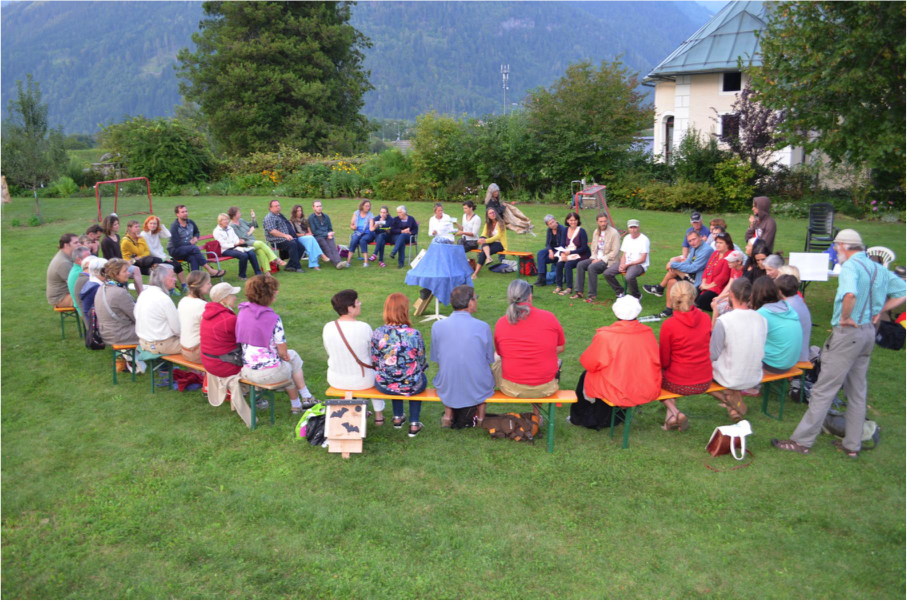
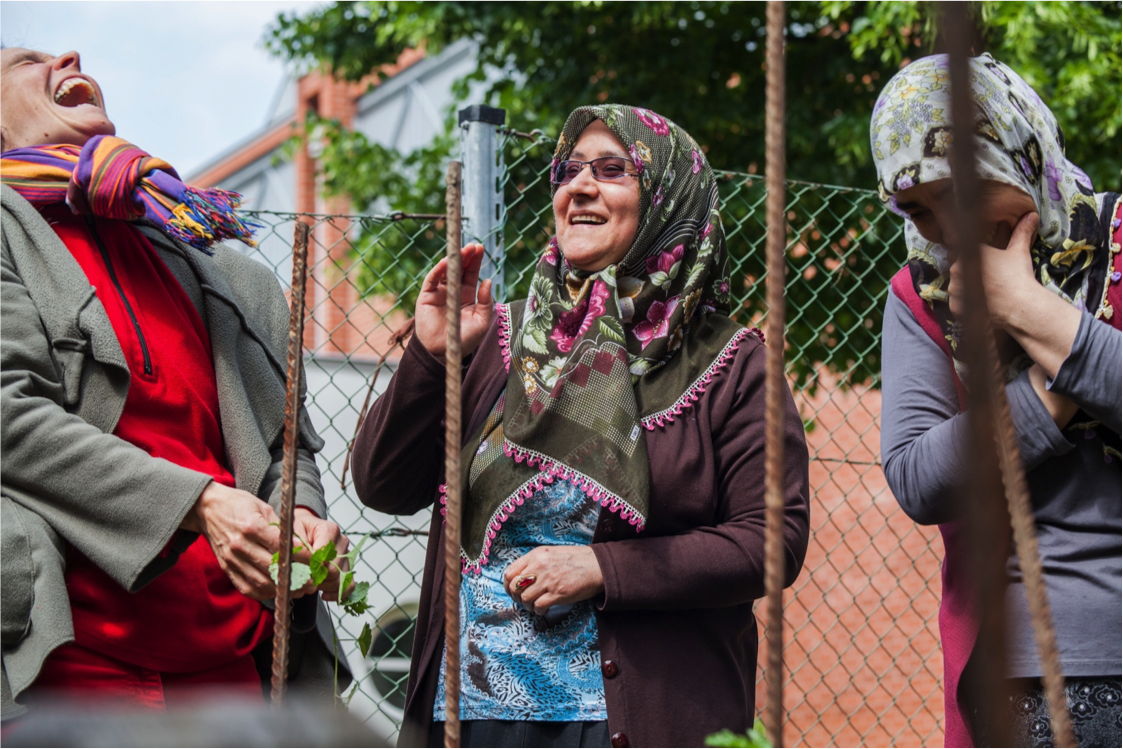
- See all people at the same level regardless their age, education, gender, nationality,..
- Be ready to use all methods to take everybody on board (despite language barriers).
- Respect that not all want help or want to participate.
- Self-empower migrants so they can discover their talents and make use of them.
- Individual talents are the main source of energy for self-empowerment.
“Be attentive to people's needs and pay attention to the talents they bring with them” (Garden manager, Garten der Begegnung, 2019)
- Follow an inclusive approach.Be aware that all people bring their individual strengths with them. At the same time be aware that certain backgrounds and experiences make it more likely for people to be marginalised or discriminated against.
- See inclusion as a learning process in both directions.
- Learn other approaches (humor, respect for the elderly and friendship might be more important than punctuality).
- A strong focus on intercultural encounter and involvement from the beginning. Integration does not occur by itself.
“Remaining open and not to have clear ideas about how something should be, but to think together with people about what works and what doesn't. I think this is very important for a community garden like ours. […] This openness is the spirit of the whole garden.” Board member, Bahrenfelder LutherGarten, 2019
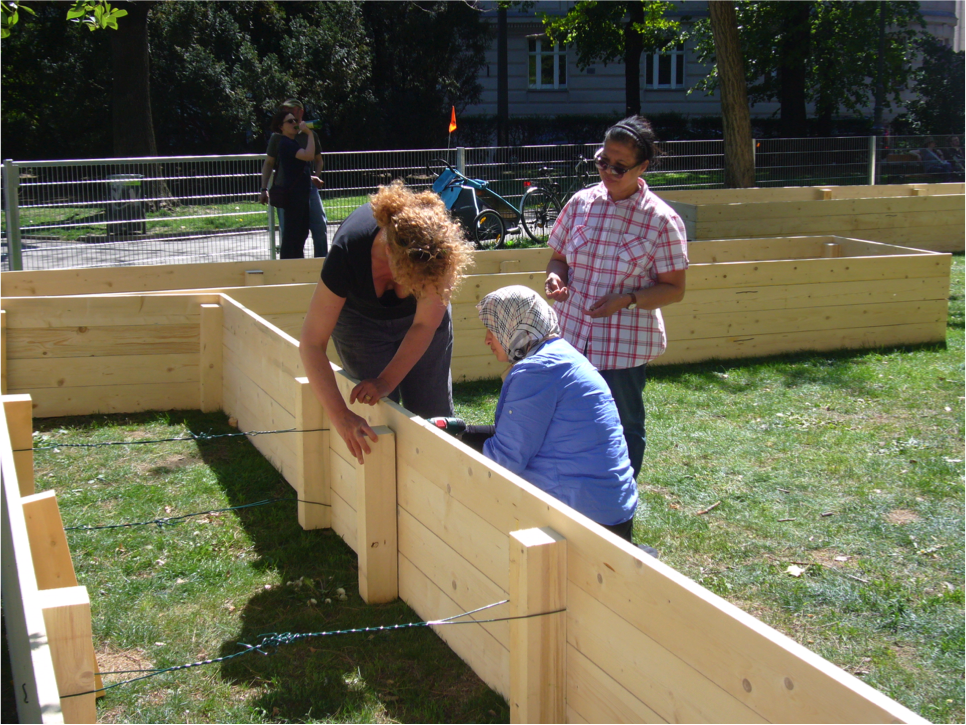
- Empower your garden group to facilitate empowerment
- Seek professional support when needed (dealing with intercultural diversity and conflicts).
- If there is no political support – seek support in the community.
- Seek a broad range of cooperations with volunteers, NGOs, institutions, churches,…
- Organise your meetings and decision making processes in order to facilitate participation
- Translate important informations in different languages.
- Provide translators for meetings.
- Find out whether people are used to speaking in a big group or need other settings to feel at ease to contribute their opinion.
- Use different communication channels as social messengers, email, sms.
- Clear structures and clearly described tasks help gardeners to engage from the start.
- Encourage participation
- Create meeting points
- Share skills & knowledge
- Encourage activities
- Offer training units
- Spaces to reach potentials
- Create easy access activities to encourage participation
- Find activities where special skills/language are not important as in community cooking sessions → (Community cooking) or social picnics → (Community picnic)
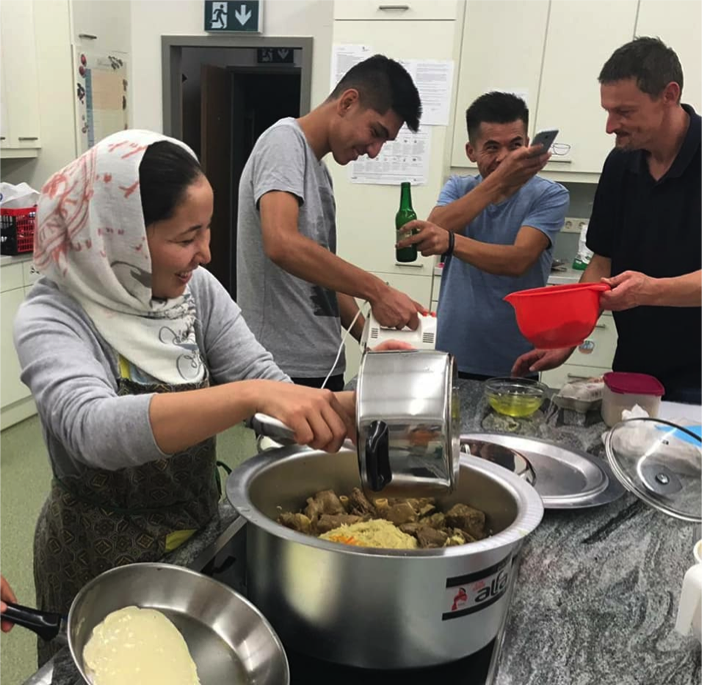
- Create spaces where people can easily seek support
- e.g. in a Café of encounter → (Begegnungscafé) or a language café → (Language café)
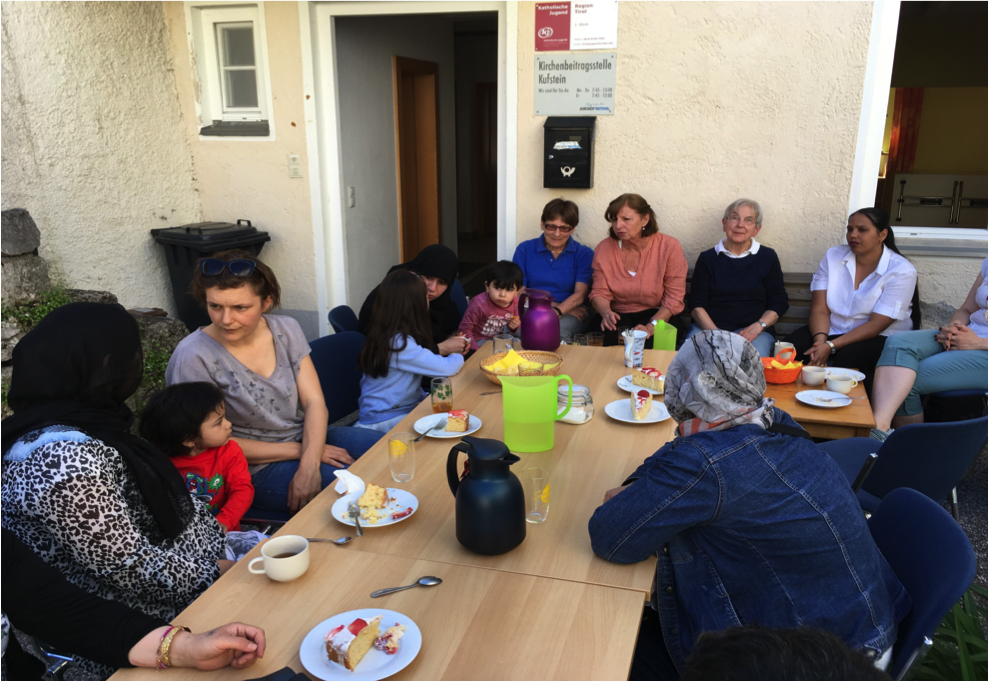
- Value peoples knowledge and experience and give room for sharing skills and knowledge
- During intercultural garden tours where people present their growing beds and tell their personal garden history → (Intercultural guided garden tour)
- In the context of workshops given by migrants like an organic agriculture course for children → (Workshop for schoolchildren) or handicraft workshops → (The Grange)
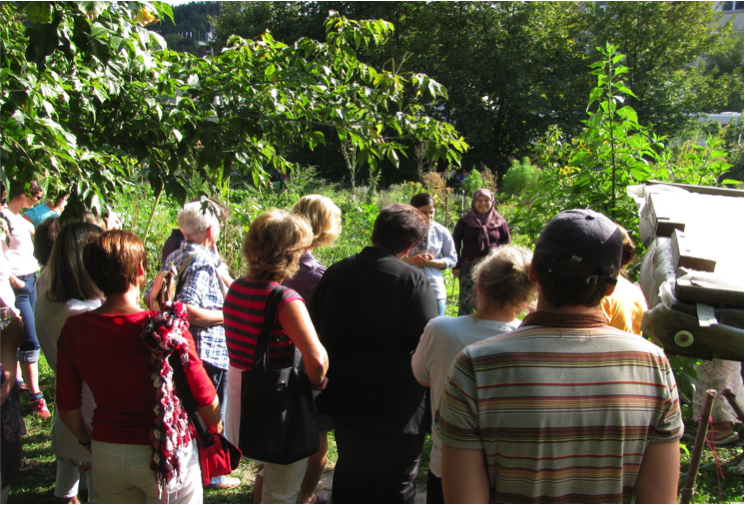
- Develop activities starting from the peoples experiences and interests
- A sewing studio with sale of products might be a good activity for people who know how to sew or bring some experience of sewing → (Nähwerkstatt – sewing studio)
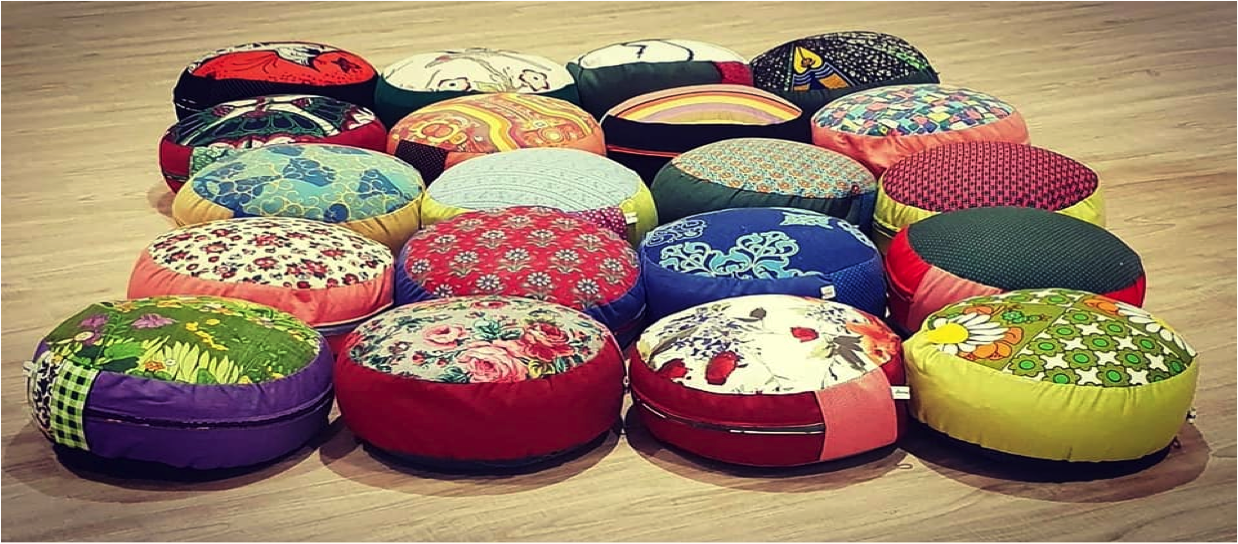
- Offer training and education according to the participants interests and needs
- This is highlighted in the training program „Flowers Connect“ in which women learn basics of garden design and flower arrangement → (Flowers connect)
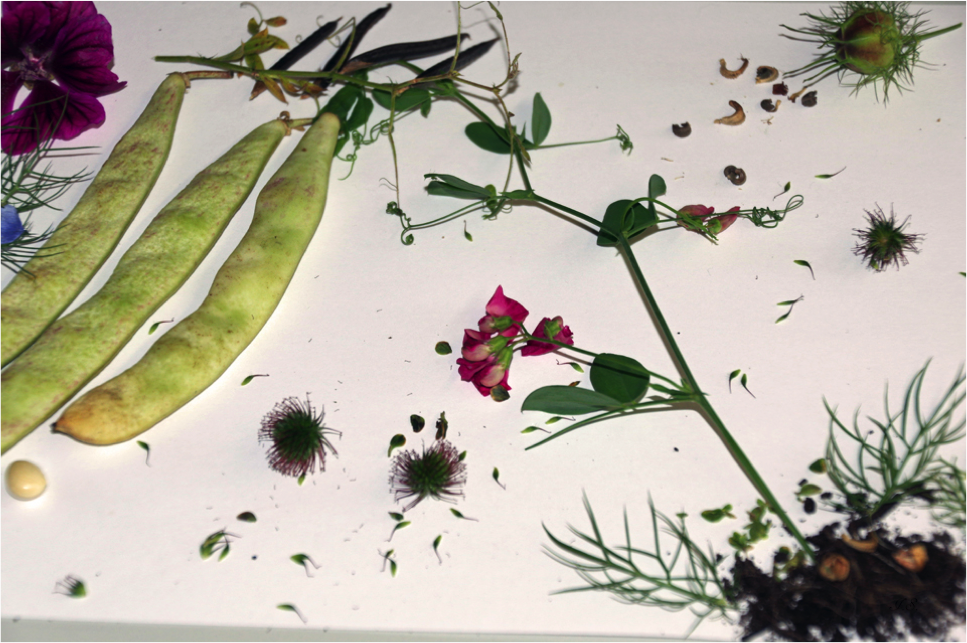
- Create spaces where people can develop their own ideas and reach their potentials.
- This is illustrated in „Global talents“ → (Global talents), a program in which people can use a studio to develop their ideas and found their own enterprise.
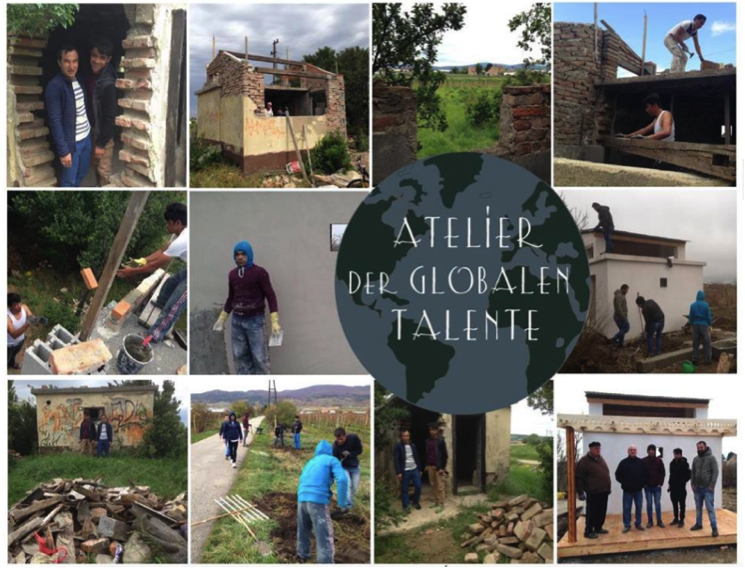
Questions for self-reflection
- Reflect on the concepts of integration and inclusion and think of what fits with your garden‘s approach.
- To which of the following statements do you agree?
- Empowerment is already part of our gardens practice
- Empowerment should definitely become part of our gardens practice
- Empowerment is.... (your own opinion)
- What helps you to create an empowering environment?
- Think of the activities presented in this module and choose one you might adapt for your garden group.
[WpProQuiz 10]
Literature
- Braye, S. & Preston-Shoot, M. (1995). Empowering Practice in Social Care. Buckingham: Open University Press.
- Filsinger, D. (2008). Bedingungen erfolgreicher Integration –Integrationsmonitoring und Evaluation. Expertise im Auftrag der Friedrich-Ebert-Stiftung, Bonn
- Georgi, V.B. (2015). Anmerkungen zu aktuellen Debatten in der deutschen Migrationsgesellschaft Integration, Diversity, Inklusion
https://www.die-bonn.de/zeitschrift/22015/einwanderung-01.pdf - Neußl-Duscher E., (2016). Transkulturelle Gemeinschaftsgärten
Ein Beitrag zur gesellschaftlichen Integration? In soziales_kapital
Wissenschaftliches Journal Österreichischer Fachhochschul-studiengänge Soziale Arbeit Nr. 15 (2016) / Rubrik "Thema" / Standort Salzburg
Internet
- UNRISD Briefing Paper No. 1 World Summit for Social Development: Social Integration: Approaches and Issues. Retrieved Juliy 27,2019 from http://www.unrisd.org/80256B3C005BCCF9/(httpAuxPages)/510920DA18B35A6880256B65004C6A7B/$file/bp1.pdf
- Caritas, 2018: factsheet Begriffsklärung Integration und Inklusion. Retrieved Juliy 27,2019 from
https://www.dbk.de/fileadmin/redaktion/microsites/fluechtlingshilfe/Caritas_Factsheet_Begriffsklaerung_Integration_Inklusion.pdf - https://dictionary.cambridge.org/ Retrieved Juliy 27,2019 from
- CIAT. Retrieved Juliy 27,2019 from
https://ciat.cgiar.org/what-we-do/gender-analysis/ - Social Farms and Gardens: gardens of sanctuary resource pack. Retrieved Juliy 27,2019 from
https://gardens.cityofsanctuary.org/wp-content/uploads/sites/134/2018/11/Gardens-of-Sanctuary-Resource-Pack-portrait.pdf

 English
English  Deutsch
Deutsch  Español
Español  Svenska
Svenska 